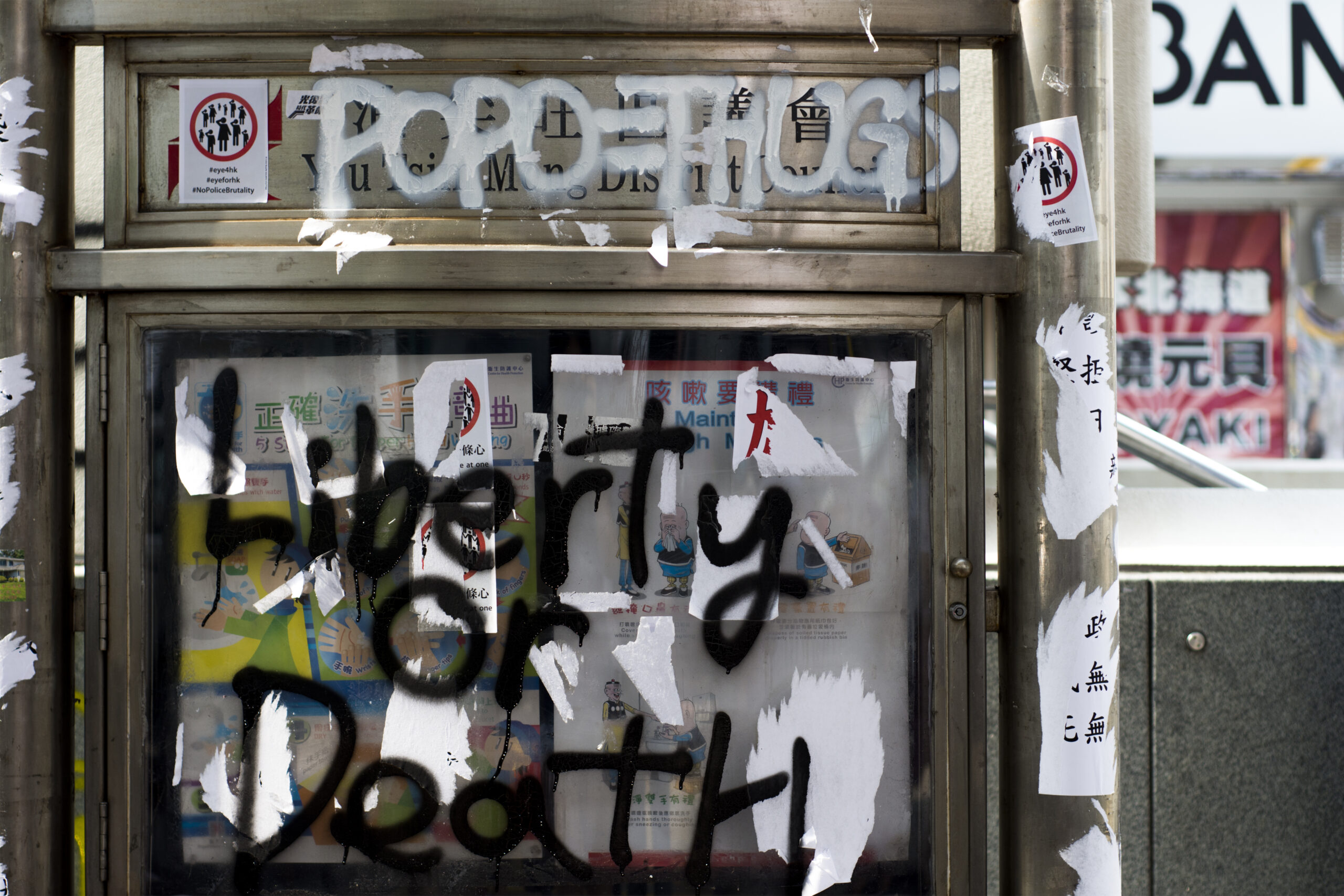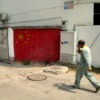Originally published by LCSA. Republished with permission.
Read the original version for a list of further readings and resources.
反抗香港和中国政治压迫的声明 / 反抗香港和中國政治壓迫的聲明
A new wave of repression
Following the last wave of protests in China, the party-state has brutally cracked down on protesters. Those who went on the streets, and workers who continued to protest for wages, pensions and better working conditions despite heavy state repression, were threatened, detained, interrogated and prosecuted.
伴随前段时间中国的大规模抗议浪潮,党国对示威者们展开了无情的政治清算。不论是走上街头抗议的居民,还是不顾打压继续为工资、养老金和工作环境进行抗议的工人们,都受到威胁、关押、审问和起诉。
伴隨前段時間中國的大規模抗議浪潮,黨國對示威者們展開了無情的政治清算。不論是走上街頭抗議的居民,還是不顧打壓繼續為工資、養老金和工作環境進行抗議的工人們,都受到威脅、關押、審問和起訴。
At the same time, the largest national security trial Hong Kong has seen to date is underway. Activists have been charged both under colonial-era sedition laws and the newly introduced National Security Law, and some face up to a lifetime in prison. Since the National Security Law went into effect in 2021, many Hongkongers, both high-profile social movement figures and rank-and-file protesters, have already been sentenced under its charges. Many more still await trial while being remanded in custody or on bail, and the newly-formed National Security division of the Hong Kong police continue to make new arrests.
与此同时,香港历史上最大规模的国家安全案正在开庭审判。行动者们被冠以殖民时期沿用至今的“煽动罪”以及新近通过的《国家安全法》罪名,部分人可能面临终身监禁。自《国安法》2021年实施后,包括知名社运人士和普通抗议者在内的许多香港人都已被这些罪名审判,另一些仍在拘留或保释候审,随国安法新成立的港警国安处也正实行进一步抓捕。
與此同時,香港曆史上最大規模的國家安全案正在開庭審判。行動者們被冠以殖民時期沿用至今的“煽動罪”以及新近通過的《國家安全法》罪名,部分人可能面臨終身監禁。自《國安法》2021年實施後,包括知名社運人士和普通抗議者在內的許多香港人都已被這些罪名審判,另一些仍在拘留或保釋候審,隨國安法新成立的港警國安處也正實行進一步抓捕。
Demands from the diaspora
As Hong Kong and Chinese diasporic activists, we stand together against political repression and demand the immediate release of all political prisoners, in Hong Kong or in China. Every person fighting for their economic and political rights should be free from fears of persecution. We stand with workers and students, with feminist activists and labour organisers, with human rights lawyers, civil journalists and democracy activists, with all oppressed people against the regime.
身为流散海外的香港和中国行动者,我们团结反对政治迫害,并要求中国政府立即释放香港和中国所有政治犯。每一个为自己的经济和政治权利斗争的人都应该免于被迫害的恐惧。我们与工人和学生站在一起,与女权行动者和劳工组织者站在一起,与人权律师、公民记者和民主派人士站在一起,与所有被压迫者一同反抗现政权。
身為流散海外的香港和中國行動者,我們團結反對政治迫害,並要求中國政府立即釋放香港和中國所有政治犯。每一個為自己的經濟和政治權利鬥爭的人都應該免于被迫害的恐懼。我們與工人和學生站在一起,與女權行動者和勞工組織者站在一起,與人權律師、公民記者和民主派人士站在一起,與所有被壓迫者一同反抗現政權。
We are acutely aware that in China, many minority ethnic groups (“shaoshu minzu“) are facing multiple forms of oppression hidden from the public view: Turkic groups such as Uyghurs and Kazakhs as well as Tibetans, Mongols and other minorities have been confronting and resisting digital surveillance, labour exploitation, mass displacement, mass incarceration, cultural disenfranchisement and more, all of which have a history long before the pandemic.
我们深知在中国,许多少数族群(“少数民族”)正面临不为公众所见的多重压迫:维吾尔、哈萨克等突厥族裔,以及藏人、蒙古人及其它族群长期面临并反抗数字监控、劳力剥削、大范围流离失所、大规模监禁、文化权利被剥夺等,这在新冠爆发前便有长期历史。
我們深知在中國,許多少數族群(「少數民族」)正面臨不為公衆所見的多重壓迫:維吾爾、哈薩克等突厥族裔,以及藏人、蒙古人及其它族群長期面臨並反抗數字監控、勞力剝削、大範圍流離失所、大規模監禁、文化權利被剝奪等,這在新冠爆發前便有長期曆史。
From protestors gathering at Ürümchi Road (“Wulumuqi Rd.”) in Shanghai, to vigils held in the diaspora explicitly demanding the closure of camps, we see encouraging signs that Chinese protesters are finally reckoning with the oppression of “minority minzu” in the state’s periphery, albeit with heavy limitations. Despite authentic desires to address the injustice, many Han Chinese struggled to grapple with the full extent of the violence, to understand the multiple forms of oppression, to find an inclusive language of solidarity beyond the constraints of state narratives, or to articulate the vision of an anti-colonial and abolitionist movement in China. Chinese-language discourses surrounding “minzu” are deeply inadequate: our everyday language on race and ethnicity is steeped in Han-centric ignorance and racist assumptions, which reflects and reinforces long under-examined structures of domination in China.
从抗议者聚集在上海的乌鲁木齐路(路牌仅标注汉语拼音),到海外离散社群中的悼念会及关闭拘禁营的明确诉求,我们看到了令人鼓舞的迹象:虽然存在严重的局限性,中国的抗议者终于开始认真面对国家边缘的“少数民族”受到的压迫。即便存在反抗不公的真诚意愿,许多汉人仍然未能捕捉这一暴力的全貌,未能理解压迫的多重性,未能找到一种包容的、超越国家话语的团结语言,也未能明确诉说一种反殖民和废除运动在中国的政治愿景。围绕“民族问题”的中文论述具有严重缺陷:我们有关种族和族群的日常语言浸透汉族中心主义的无知和种族主义假设,这反映并强化着中国长期没有获得充分检视的那些压迫性系统。
從抗議者聚集在上海的烏魯木齊路(路牌僅標注漢語拼音),到海外離散社群中的悼念會及關閉拘禁營的明確訴求,我們看到了令人鼓舞的迹象:雖然存在嚴重的局限性,中國的抗議者終于開始認真面對國家邊緣的「少數民族」受到的壓迫。即便存在反抗不公的真誠意願,許多漢人仍然未能捕捉這一暴力的全貌,未能理解壓迫的多重性,未能找到一種包容的、超越國家話語的團結語言,也未能明確訴說一種反殖民和廢除運動在中國的政治願景。圍繞「民族問題」的中文論述具有嚴重缺陷:我們有關種族和族群的日常語言浸透漢族中心主義的無知和種族主義假設,這反映並強化著中國長期沒有獲得充分檢視的那些壓迫性系統。
Without confronting the patriarchal Han chauvinist and capitalist domination of minority ethnic groups in China, a social movement about China’s political future cannot be truly liberatory.
Without confronting the patriarchal Han chauvinist and capitalist domination of minority ethnic groups in China, a social movement about China’s political future cannot be truly liberatory. We continue to demand the abolition of prison camps, an end to settler-colonial violence, full economic, political and cultural rights for minority ethnic groups and for their right to self-determination; we need continued discussions on the realities in the Uyghur region, Tibet and other places, to address urgent humanitarian crises, counter sinister denialism and critically engage with different visions for our political future in China and the diasporas.
除非直面父权的汉族沙文主义和资本主义对少数族群的统治,一个关系中国政治未来的社会运动不可能是真正的解放运动。我们要求关闭拘禁营,结束定居殖民暴力,保障少数族群完整的经济、政治和文化权利,并支持这些族群的自决权;我们同时必须继续讨论维吾尔地区和西藏等地的现实,回应紧迫的人道主义危机,应对恶毒的否认论调,并与中国和海外离散社群中关于我们共同政治未来的不同视野进行批判性互动。
除非直面父權的漢族沙文主義和資本主義對少數族群的統治,一個關係中國政治未來的社會運動不可能是真正的解放運動。我們要求關閉拘禁營,結束定居殖民暴力,保障少數族群完整的經濟、政治和文化權利,並支持這些族群的自決權;我們同時必須繼續討論維吾爾地區和西藏等地的現實,回應緊迫的人道主義危機,應對惡毒的否認論調,並與中國和海外離散社群中關於我們共同政治未來的不同視野進行批判性互動。
Connecting our struggles
When people raised sheets of blank paper in Chinese cities to protest the draconian “zero-Covid” lockdowns, the gesture of defiance echoed with Hongkongers protesting the National Security Law in 2020. People who took collective actions were brutally beaten up and dragged away by riot police, we could hear a protester in Shanghai shouting “fuck the police,” and many who were used to staying away from the stability-maintenance machine were confronted with naked state violence for the first time. Many started to connect the two social movements under the rule of the same party-state, if not already.
当人们在各城市举起白纸反抗严苛的“清零”政策时,这一违抗的符号与香港人在2020年反抗《国安法》时的行动遥相呼应。集体反抗的人们被警察野蛮殴打和逮捕,我们听到一位抗议者在上海街头发出“fuck the police”的呼喊,许多平日与维稳机器保持距离的人们首次与赤裸的国家暴力直接碰撞,很多人(或许并非首次)在同一政权统治下的两地社会运动之间建立起联系。
當人們在各城市舉起白紙反抗嚴苛的“清零”政策時,這一違抗的符號與香港人在2020年反抗《國安法》時的行動遙相呼應。集體反抗的人們被警察野蠻毆打和逮捕,我們聽到一位抗議者在上海街頭發出「fuck the police」的呼喊,許多平日與維穩機器保持距離的人們首次與赤裸的國家暴力直接碰撞,很多人(或許並非首次)在同一政權統治下的兩地社會運動之間建立起聯系。
Hong Kong has long been a crucial site of support for Chinese labour and democratic movements, as people moved across the border, sought economic opportunities or political refuge, and became part of the local and transnational struggles. Hong Kong civil society has been a committed supporter of social movements in China: Hong Kong activists were imprisoned in the mainland for their activism, many currently awaiting trial have been charged precisely for their support for mainland democracy movements including Tiananmen.
香港一直为中国的劳工和民主运动提供了至关重要的支持,许多人穿过边境寻求经济机会或政治庇护,并成为当地和跨国抗争的一员。香港的公民社会一直是中国社会运动的强力支持者:香港的行动者曾因参与运动在内地服刑,而在当前的国安法案中,很多港人恰恰是因为支持六四在内的内地民主运动而被捕。
香港一直為中國的勞工和民主運動提供了至關重要的支持,許多人穿過邊境尋求經濟機會或政治庇護,並成為當地和跨國抗爭的一員。香港的公民社會一直是中國社會運動的強力支持者:香港的行動者曾因參與運動在內地服刑,而在當前的國安法案中,很多港人恰恰是因為支持六四在內的內地民主運動而被捕。
Political movements and radicalism also spread to Hong Kong from elsewhere. Despite heavy political defeat, workers and activists, many of whom migrants from China and the rest of Asia, continue to supply political vitality and shape the landscape of Hong Kong’s social movements. They challenge the logic of border control, demand a pluralistic Hong Kong identity, and foster an inclusive social movement in solidarity with the most marginalised and invisiblised.
政治运动和激进主义也从其它地方传播到香港。即便经历了重大的政治挫败,工人和组织者——许多是来自中国和亚洲其它地区的移民——仍在继续为香港的社会运动提供政治活力并塑造其格局。她们挑战着边境控制的逻辑,呼唤一个多元的香港身份认同,并培育一个与最为边缘和隐形的人们站在一起的、包容的社会运动。
政治運動和激進主義也從其它地方傳播到香港。 即便經歷了重大的政治挫敗,工人和組織者——許多是來自中國和亞洲其它地區的移民——仍在繼續為香港的社會運動提供政治活力並塑造其格局。 她們挑戰著邊境控制的邏輯,呼喚一個多元的香港身份認同,並培育一個與最為邊緣和隱形的人們站在一起的、包容的社會運動。
During last years’ overseas protests, many Hongkongers joined Chinese activists and passed on their knowledge from past struggles on how to protest safely, how to organise effectively, and how to look after each other. Conversations began to replace scepticism, many who used to regard mass movements in Hong Kong and their prospects in China with pessimism or cynicism are now changing their minds.
在去年的海外抗议潮中,许多香港人加入了中国行动者的队伍,并传递自己的运动经验:如何在抗议时保证安全,如何有效地进行组织,如何彼此关怀。对话开始取代怀疑的态度,许多曾对香港群众运动及大陆社运前景感到悲观或不屑的人正在改变观点。
在去年的海外抗議潮中,許多香港人加入了中國行動者的隊伍,並傳遞自己的運動經驗:如何在抗議時保證安全,如何有效地進行組織,如何彼此關懷。對話開始取代懷疑的態度,許多曾對香港群衆運動及大陸社運前景感到悲觀或不屑的人正在改變觀點。
The possibilities of internationalism and diaspora
We are fighting globalised systems of oppression in which the Chinese state is thoroughly complicit and offers no better alternative. Hong Kong was made to maintain its executive-led political system and neoliberal economic system precisely for its role as a bridge between Chinese and Western capital. After the handover in 1997, its new rulers in Beijing inherited and continued to improve upon colonial governance infrastructures and further facilitated the penetration of corporate power into the political system, while mobilising nationalist forces to create a new political identity obedient to Beijing. The UK and the Hong Kong governments continued to collaborate on police training, while China took direct inspirations from global counterinsurgency and produced a “Xinjiang Mode” of policing which continues to terrorise Uyghur people to this day.
We are fighting globalised systems of oppression in which the Chinese state is thoroughly complicit and offers no better alternative.
我们反抗的是全球化的压迫性系统,而中国是这一系统的重要共谋者,而非一个更好的选项。正是作为链接中国和西方资本的桥梁,香港被迫维系行政主导的政治体制及新自由主义经济体制。在1997年主权移交后,北京的新统治者继承了殖民时期的治理设施并对其进行改进,进一步帮助企业渗透政治系统,同时动员民族主义力量创造一个服从北京的新政治身份。英国和香港政府继续合作进行警察训练;与此同时,中国政府学习全球反恐战略并制造了“新疆模式”,这一治安维稳策略至今仍在恐吓和恐怖化维吾尔人。
我們反抗的是全球化的壓迫性系統,而中國是這一系統的重要參與者,并非另外的選項。正是作為鏈接中國和西方資本的橋樑,香港被迫維繫行政主導的政治體制及新自由主義經濟體制。在1997年主權移交後,北京的新統治者繼承了殖民時期的治理設施並對其進行改進,進一步幫助企業滲透政治系統,同時動員民族主義力量創造一個服從北京的新的政治身份。英國和香港政府繼續合作進行警察訓練;與此同時,中國政府學習全球反恐戰略並製造了“新疆模式”,這一治安维稳策略至今仍在恐嚇和恐怖化維吾爾人。
Political activism in the diaspora will continue to play a crucial role for resisting interlinking chains of global capitalism, for building communities where people from different movements can recognise each others’ struggles. Solidarity is not to be taken for granted but forged through common struggles. Only through standing together can we overcome chauvinism, bigotry and historical resentments, to unite and fight for our common liberation.
在抵抗资本主义全球链条的抗争中,在帮助不同运动的人们辨识彼此抗争的社群建设中,海外离散社群的政治行动将会持续扮演重要作用。团结不能被视作理所当然,它只能通过共同的斗争铸成。唯有通过互相支持,我们才能克服沙文主义、偏见和历史遗留的怨恨,我们才能团结在一起,为共同的解放斗争。
在抵抗資本主義全球鏈條的抗爭中,在幫助不同運動的人們辨識彼此抗爭的社群建設中,海外離散社群的政治行動將會持續扮演重要作用。團結不能被視作理所當然,它只能通過共同的鬥爭鑄成。唯有通過互相支持,我們才能克服沙文主義、偏見和歷史遺留的怨恨,我們才能團結在一起,為共同的解放鬥爭。




